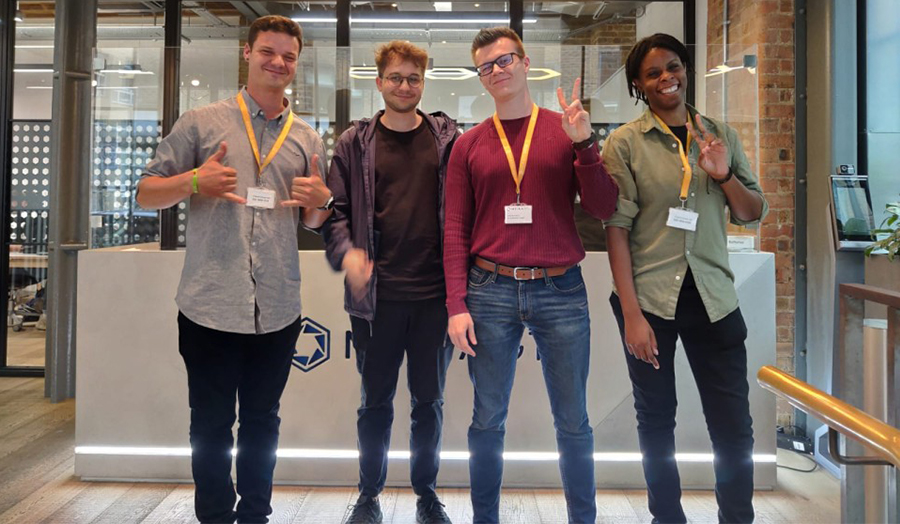Games students in the School of Computing and Digital Media designed and developed a health and safety video game for MeiraGTx, a gene-therapy company based in London.
Date: 14 October 2022
A team of students studying Games Programming and Games Animation, Modelling and Effects helped MeiraGTx to realise their plan to introduce a brand new method of teaching and training fire drills, using video game technology.
The project aimed to create a video game simulation for fire safety training for work environments where traditional fire drills are impractical or impossible. For example, this could be applied in fire drills in hospital wards or operating theatres which would typically put patients at risk.
A further example used in the training was for cleanrooms, used in manufacturing pharmaceuticals. Running a fire drill in such an environment is only feasible during a maintenance shutdown period, otherwise you risk contaminating the facility and the manufacturing process. As staff can join workplaces like this at any time of the year, waiting for a shutdown could mean a full 12 months until the experience of a drill.
Rosie Russell, Head of Environment, Health and Safety (EHS) at MeiraGTx who led the project, reached out to Fiona French, senior lecturer and course leader for BSc Games Programming, and Fiona assembled a team of skilled London Met students. Over the next couple of months, the team worked with staff at MeiraGTx to design and develop a game, with programmers Isaac Furieri and Csaba Maczó and artists Adisa Walker and Mateuz Jarzembinski coming on board for the summer in part-time paid internships.
The game experience was a resounding success, with Rosie saying, “Now, with an in-depth briefing of the evacuation procedures and practical demonstration of the escape hatches, we can train staff when they first arrive, before they ever enter the facility, and we do not need to wait for a shutdown to deliver potentially lifesaving training.”
Fiona recognised the importance of this opportunity, “it has been great for our students to work with colleagues at MeiraGTx over the summer. They have shown how creative and skilful they can be in this project, where they were given freedom to experiment with new ideas and techniques for motivating gameplay and training. We intend to continue working with MeiraGTx, and offer more of our undergraduate game developers the chance to develop interactive simulations for real-world contexts.”
Fiona teaches game development skills, interaction design and programming for Games Programming BSc (Hons) and Games Animation Modelling and Effects BSc (Hons) students. She also teaches gamification for Digital Media MA students and artificial intelligence to a varied cohort from the School of Computing and Digital Media.
Student participant Adisa Walker was thankful for the chance to work with MeiraGTX, "it was such a great experience. At first the concept felt challenging but I had so much fun working on the project with the team and watching the game come together. I learnt a lot about teamwork and what it takes to create a video game harmoniously.
"This project also really helped me have more confidence in myself and my abilities. As a 3D artist my responsibilities were to build realistic 3D models from the MeiraGTX lab, then paint and create textures for those objects. For me the highlight was watching people play and enjoy our game during the testing week. And the fact that after playing through the levels people felt more confident about what to do in a real fire evacuation".
Another participant, Isaac Furieri, said, "Participating in a real project with MeiraGTX was a fun and challenging experience, I learned a lot about how to organize a project and work as a team. My main responsibilities were developing code, managing the project repository, testing the game, and getting feedback from volunteers who agreed to participate in testing to improve the game.
"The highlight of this experience was the contact with MeiraGTX to transform the risks and challenges of doing a fire simulation in their laboratories into a simulation game where they could learn the procedures and better understand what to do in a real fire situation."

